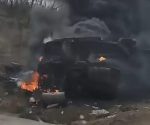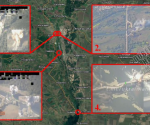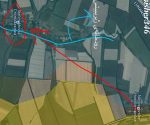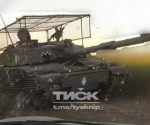War criminals get a taste of their Syrian medicine; SAS in the desert pocket?
“Unarmed protesters… shot by Israeli snipers”; British corporate-media – this from the Telegraph – doesn’t even try to deny the terrible atrocity that happened in Gaza this week just gone. Take heed, reader, of the Israel Defence Force’s easy slaughter of Palestinians. Take heed for its own sake. Although Gaza is self-governing, “Israel maintains direct external control over Gaza and indirect control over life within Gaza” (Wikipedia), so this episode is a reflection of the Israeli State’s relationship with a group of people who come under the weight of its control, rather than war crime, as some like to call it. But it stands to reason that a Government that commits war crime will kill people who are problematic for its administration – because the end always justifies the means. Last week also brought news, from not a million miles away from Israel, that reminds that the UK is committing war crime in Syria, and, for that reason also, you need to take heed of the mass murder on the Gaza border for what it can tell you about what the British Government is capable of.
An SAS soldier, who wasn’t supposed to be there, was killed in Syria. Although the Ministry of Defence had a story to explain the death, the only thing that it could tell us unequivocally was that the British Government is very worried about the war crime it is committing in Syria (as was the exact same case in Libya). The following is an extract from the MoD’s tale, via the Indpendent:
It is with regret that we must confirm that a member of the UK Armed Forces was killed by an improvised explosive device in Syria yesterday.
The individual was embedded with US forces on a counter-Daesh operation when the incident occurred.
Note well that by “embedded with US forces”, the MoD means under the jurisdiction of the US military – thus it shields itself from the clear illegality of a British presence in Syria by hiding behind the mandate that the USA has granted itself. Naturally, by operating militarily in Syria, the US Government is acting illegally too. Obviously, there is an idea that the US is immune to charges of international war crime, whereas Britain is not. Maybe the latter is something that needs to be tested, and the former remains to be seen. In any case, none of this covers the culpability of an individual British soldier, whomever he is taking orders from. After the Nuremberg Trials, individual British soldiers in Syria are war criminals too. There is no “I was only following orders” defence. The SAS soldier – and although it might get pasted here as part of a quote, he won’t receive the distinction of having his name typed out afresh – was the exact opposite of a hero, as the corporate-media likes to describe him.
Of course, the “hero” epithet is sold as being deserved by UK perception shapers in the context of the phoney fight against ISIS – that outrageous hoax that serves as a pretext for the illegal occupation of Syria east of the Euphrates and in other pockets. As the reader can see, the British soldier’s death was carefully framed to be seen from the anti-terror perspective. He was fighting Daesh (they don’t like to refer to ISIS using the same name as their moon goddess).
But this claim is problematic. ISIS has no reason to be in Manbij – the northern city in Aleppo province where the killing occurred. The official story has it that the British soldier, along with one from the US, was killed when the vehicle he was travelling in was hit by an Improvised Explosive Device (IED). But ISIS is trapped on the Iraqi border, and in a small pocket around the Euphrates where the river leaves Syria, and in a pocket in the desert south of al-Mayadan. No one can be said to be mopping up in Manbij after ISIS, who departed from the city in 2016. Please note, the author refuses to tell the reader that ISIS were expelled from Manbij. His many assessments to date (here’s one) that YPG capabilities have been enormously exaggerated have been proven correct by events in Afrin. His opinion is this: if any real fighting was done in the US-Kurdish surge out of north east Syria (as opposed to pat-a-cake with a foe putting up minimal resistance to serve as a show of fighting between two sides both ultimately controlled by the USA), it was done by foreign special operations forces.
It looks like there was an unofficial effort to address the snafus in the “death in Manbij” narrative via a Mail on Sunday report – with material provided by an SAS source. Note, in this version there is no Daesh. Instead, and after years where the public were told that there was no such thing, the enemy is outed as “jihadists” and “extremists” in the “Free Syrian Army” (“FSA”):
The first British soldier to be killed fighting jihadis in Syria was named last night as Special Air Service sniper Matt Tonroe.
The battle-hardened sergeant from Manchester was killed in the northern city of Manbij on Thursday night while on an undercover mission to kill extremists.
The attribution of blame to the FSA comes later in the article, as we can see:
SAS sources also revealed last night how the terrorists who planted the bomb could belong to the Free Syrian Army (FSA), an affiliation of militia, including jihadi elements, which is backed by Turkey. If the investigation into the incident concludes this was the case, it could lead to a diplomatic row with Turkey, a Nato member.
So we appear to be presented with the idea that the Americans in Manbij are treating the Turkish FSA (which is the faction in question) as targets to kill. Could this be even remotely correct in the light of the prospect of a dispute with a NATO ally, and a Turkish incursion into Manbij that, if it sees the need to become committed, will crush the US-coalition forces there (expect to see evacuation helicopters)? Information carried by the Mail on Sunday regarding an SAS withdrawal from Manbij (as we shall see) is more realistic: “The main reason behind the SAS getting out of there is the fear of a proxy conflict between fellow Nato members”.
While we can well believe that the SAS would be frightened, it is a strange choice of words. Nevertheless, there has been talk of an eventual FSA attack on Manbij since January, and the least that can be said about that threat is that it is currently being talked up by the US-coalition side, as demonstrated by a Sputnik article which cites an unnamed SDF source.
But a threat of war is one thing, while a currently ongoing campaign is another – and the Mail on Sunday piece suggests that the IED attack would be a feature of current fighting as “jihadis aligned with the Free Syrian Army are seeking to take over [Manbij]”:
The Mail on Sunday has been told how other British Special Forces troops have been wounded in separate clashes with jihadis in Manbij in recent weeks – and that Sgt Tonroe and his colleagues had been due to withdraw from the area just days before he was killed. This was not confirmed by the MoD – it does not disclose any details about SAS operations.
As far as anyone knows – according to the noises coming out the US State Department – the US is not going to withdraw from Manbij ahead of a Turkish incursion. Note that the SAS source seems to have forgotten that the public has been told that the SAS in Manbij have been attached to the US military – so presumably it would be the US chain of command who would be making decisions about where its SAS contingent would go. This is not the only narrative incongruence. Have the SAS really been involved in clashes with the FSA in the Manbij area? The author doesn’t believe it.
The truth is possibly this: the SAS is involved in fighting in other parts of Syria – and within a British chain of command – in places where, if they were to be discovered, they would get the UK Government into all sorts of trouble. So, dear reader, ask yourself this – has this Mail on Sunday article revealed too much than it should have? Where, in Syria, has the fighting been most intense in “recent weeks”? On the face of it, the answer would surely be East Ghouta – and we have discussed the possibility of SAS being in that place and directing the likes of Jaysh al-Islam previously at FBEL. That being said, Ghouta, being the scene of a mass surrender by US-backed mercenaries, has been quiet – and evidently remained so on the 29th March (the date that the SAS soldier’s death was made public) – so we would probably have to rule it out as a candidate, but never mind; there was fighting in other another place in Syria on the same day. A report emerged about the commencement of a Syrian operation (involving Liwa al-Quds, the National Defense Forces and the Syrian Arab Army) to deal with ISIS in the desert pocket south of Mayadin.
In fact, a write-up (dated 25th March?) by the Syrian Observatory for Human Rights (i.e. the lad in Coventry), revealed that fighting in the desert near Mayadin had been taking place for some considerable time ahead of the 29th, and detailed a very specific method by which Syrian soldiers were supposed to have died:
The Syrian Observatory for Human Rights learned that 26 members at least of the regime forces and militiamen loyal to them of Syrian and non-Syrian nationalities were killed, as well as the death of 9 members at least of the “Islamic State” organization, during clashes between the both parties yesterday, in Al-Mayadin Desert in the eastern countryside of Deir Ezzor… Saturday the 24th of March 2018… [T]he fighting was accompanied by the sound of a violent explosion caused by detonating a booby trapped vehicle by the organization [ISIS], during an attack on members of the regime forces and militiamen loyal to them in the area located west of Euphrates River, and the Syrian Observatory for Human Rights learned that the organization took advantage of a dust storm that took place in the area to carry out this attack against the regime forces; in order to inflict the largest possible number of casualties.
Now, Southfront reports (link above) that the Mayadin desert operation constitutes an effort to “[crack] down ISIS cells operating in this desert area. The operation comes amid the increasing ISIS activity in eastern Syria. ISIS units have conducted a series of attacks on government positions near the T2 pumping station, al-Mayadin and al-Bukamal.” If the Syrians were dealing with raids out of the desert pocket by ISIS, it would be more likely that it was they who would have ambushed ISIS (with the booby trap being part of that action), not the other way around.
Of course, the UK Government doesn’t have to tell the truth about any detail about the death of an SAS soldier in Syria – and we should expect it not to – not the date of the death, nor the location, nor the method of the killing, and so one can’t realistically hope to find a lead from such an obvious coincidence as has here been demonstrated. And yet, incidents like the Skripal case inform us that “Britain’s finest” are not the brightest. Who is to say that they didn’t become unimaginative in a cover story for the SAS death right at the very moment that it was absolutely imperative that they shouldn’t? British forces in Syria are already war criminals – the only question we need to ponder is the degree to which this is the case. Why should it be a surprise to discover that they are posing as ISIS to harry the Syrian rear in Deir Ezzor?
The FBEL reader, of course, will not need reminding that the War on Terror illusion has given the British Government an excuse to put the SAS on the streets of Britain. Take heed of the massacre in Israel.



















SpartUSA is not part of the International Criminal Court. It has yet to ratify the statute because of exceptionalism.
Some suggest that the West war criminals are untouchable because laws weren’t written when they carried out their crimes.
I say take a look at the Nuremberg trials. What was good enough for the West(winners) then is go enough for the West(losers) now.